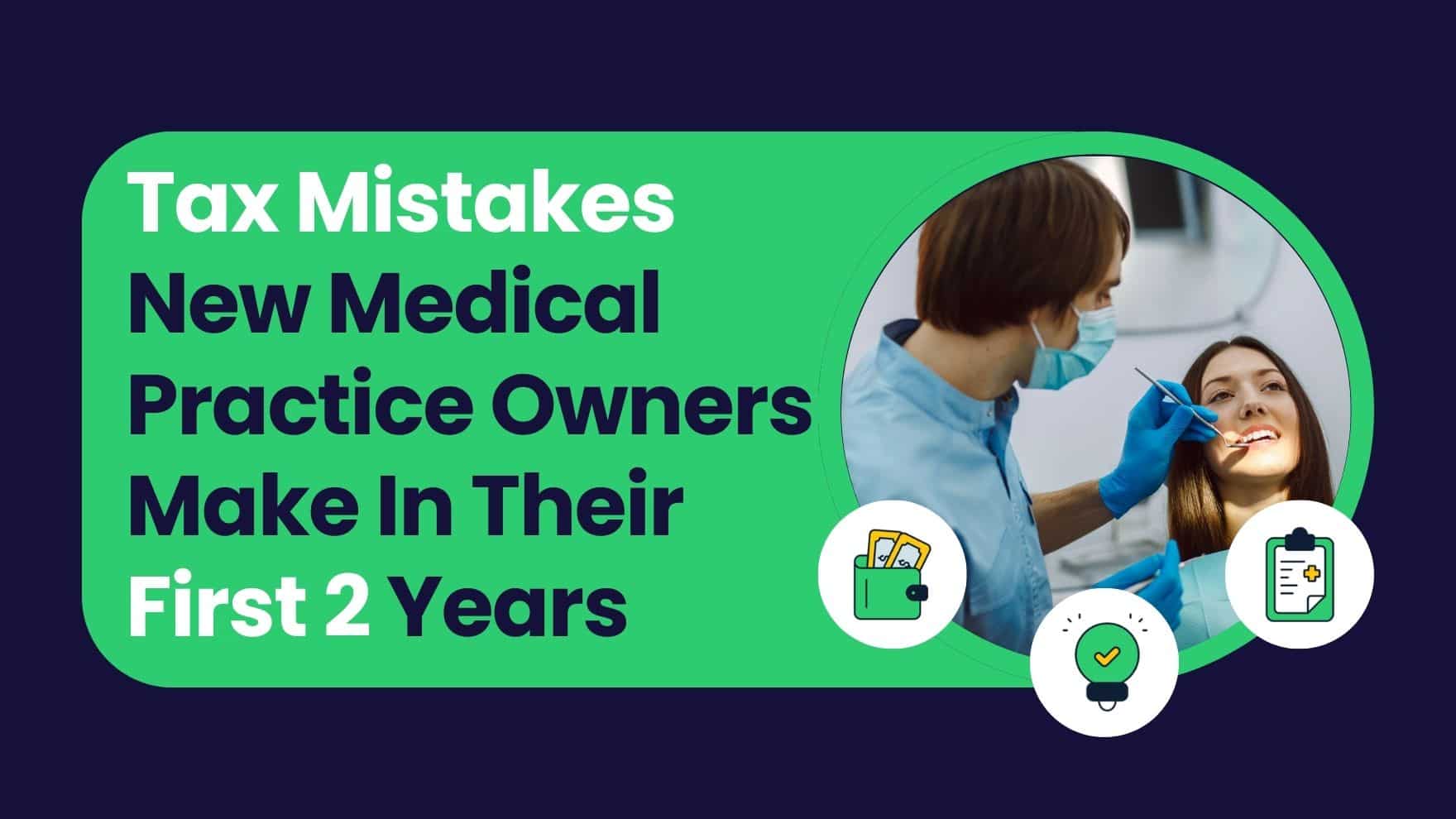If you’re a physician and you’ve set up your business as an S Corporation, or you’re thinking about making the switch, one of the most common questions we hear from those learning what is a reasonable salary for S-Corp for physicians is:
What should I actually pay myself?
It’s a smart question and one that can have a big impact on how much tax you owe and how your business operates.
The answer isn’t always simple, but we’re going to break it down in plain language and walk you through a reasonable salary for S-corp for physicians.
Let’s start with the basics.
Why Salary Even Matters in an S-Corp
One of the main perks of setting up an S-Corp is the potential to save money on self-employment taxes.
With a regular LLC or sole proprietorship, everything you earn is subject to that 15.3% self-employment tax*. That includes both Social Security and Medicare taxes, and it can really add up.
But with an S-Corp, you’re considered both an owner and an employee. So the IRS says, “Fine, you can take part of your income as a distribution and skip some of the taxes. But you also have to pay yourself a reasonable salary first.”
This is where things get a little tricky.
The salary you pay yourself has to be what is a reasonable salary for S-Corp for physicians, which is the IRS’s way of saying it has to reflect the actual value of the work you do. You can’t just pay yourself a tiny salary and take the rest as tax-free distributions.
That’s a red flag for the IRS, and it can lead to audits, penalties, and back taxes if they decide your salary wasn’t reasonable.
*The 15.3 % rate only applies up to the Social-Security wage base ($176,100 in 2025). Above that limit, only the 2.9 % Medicare tax (plus the 0.9 % Additional Medicare surtax on wages over $200 k single / $250 k MFJ) applies.
So What Counts as “Reasonable” for a Physician?
“Reasonable” is one of those words that feels vague until you dig into it.
For physicians, we can actually get a decent idea of what’s considered reasonable by looking at industry benchmarks and average pay across specialties.
Let’s take a look at some national averages. According to recent physician compensation reports, most primary care doctors earn between $200,000 and $250,000 per year. Specialists earn more.
For example, anesthesiologists often earn over $400,000, orthopedic surgeons can hit $500,000 or more, and dermatologists are somewhere in the $350,000 range depending on location and workload.
Now, if you own your own S-Corp and are practicing full time, your reasonable salary should probably fall somewhere in that ballpark, depending on your specialty.
If you’re working part-time or running a telemedicine side business, your salary can absolutely be lower. The IRS isn’t going to expect you to pay yourself like a full-time hospitalist if you’re only working two days a week doing video visits.
For example, let’s say you’re a board-certified internal medicine physician who owns a concierge-style practice and works about 30 hours a week. You don’t see quite as many patients as a traditional primary care doc, but when considering what is a reasonable salary for S-Corp for physicians, you offer higher-touch service and charge a premium.
A reasonable salary for you might be $180,000 to $220,000 depending on your location and practice revenue.
On the other hand, if you’re a full-time anesthesiologist running an S-Corp and billing out $600,000 per year, the IRS might expect you to pay yourself closer to $300,000 or more as salary before taking the rest as distributions.
What Happens After You Pay Yourself That Salary?
Here’s where the tax savings of the S-Corp kick in. Once you’ve paid yourself that reasonable salary, any remaining profits can be taken as distributions. These distributions aren’t subject to self-employment tax, which can lead to significant savings.
Let’s walk through a real-world example.
Suppose your S-Corp earns $400,000 in net income for the year. You decide to pay yourself a $200,000 salary, which is reasonable for your specialty and hours. That salary gets hit with employment taxes, just like any other paycheck.
But the other $200,000? That comes to you as a distribution and skips the 15.3% self-employment tax. On that $200,000 alone, when figuring what is a reasonable salary for S-Corp for physicians, you’d save over $30,000 in taxes. That’s money that stays in your business, goes into your retirement account, or helps you grow your practice.
Of course, if you try to pay yourself a salary that’s way too low—like $60,000 in that same scenario—the IRS could step in and say, “Nope, that’s not reasonable. We’re reclassifying some of those distributions as wages, and you owe back taxes plus penalties.”
That’s why getting this right is important. It’s not just about saving money. It’s also about staying out of trouble.
How to Know What Salary is Right for You
If you’re not sure what salary makes sense for your situation, you’re not alone. Most doctors don’t have time to wade through IRS guidelines or research national salary surveys.
That’s why we created a simple tool to help: the S-Corp vs. LLC Tax Calculator.
You plug in your expected income, estimate what is a reasonable salary for S-Corp for physicians, and it shows you exactly how much you’d save in taxes as an S-Corp versus staying an LLC. It even helps you play with different salary scenarios so you can find the right balance between saving money and staying compliant.
If you’re the type who likes to get a sense of the numbers before chatting with an accountant, this calculator is for you.
Learn more about practical strategies in 5 Tax Hacks Every Doctor Should Know in 2025.
Final Thoughts
Choosing an S-Corp can be a smart move for physicians who want to lower their tax bill and run a leaner, more tax-efficient practice.
But with great power comes great responsibility… or at least a responsibility to pay yourself properly.
A reasonable salary for S-Corp for physicians is based on the work you actually do, not just how much your business earns. It’s about being fair, thoughtful, and honest in how you split up your income between payroll and profits.
If you’re close to the national averages and can justify your number with data or your workload, you’re probably in good shape.
Still unsure what makes sense for your practice?
That’s exactly what we help doctors with every day. We’ll help you figure out what your salary should be, how to structure your payments, and how to make the most of your S-Corp setup.
Try the calculator if you want to crunch some numbers on your own.
Or reach out to us for a one-on-one conversation. You became a doctor to help people. We became accountants to help people like you keep more of what you earn.
Until next time!



